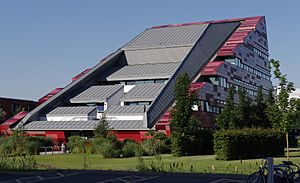Education in Nottingham facts for kids
Education in Nottingham is managed by the local government, the Nottingham City Council. They make sure schools and colleges in Nottingham work well.
Contents
How Education Started in Nottingham
Education in Nottingham has a long history. A group called the Nottinghamshire Education Committee started managing schools on 1 July 1903. This happened after a new law, the Education Act of 1902, was passed. Before 1998, schools in Nottingham were looked after by the Nottinghamshire County Council.
In 1957, something new happened: BBC school TV shows started! Four schools in Nottingham watched these shows from September to December 1957. The Director of Education at the time, WG Jackson, wondered if watching TV for learning was a good idea.
Types of Schools in the Past
Over the years, Nottingham has had many different types of schools. Some of these schools have changed their names, merged with others, or closed down.
Former Secondary Schools
- Bishop Dunn RC Secondary School: This school in Aspley opened in 1965. It is now part of Trinity School, Nottingham.
- Cottesmore School for Girls
- Ellis Secondary School: Located in Basford.
- Farnborough Secondary School: This school in Clifton is now called Farnborough Spencer Academy.
- Fernwood School: This school is now the larger Fernwood School.
- Greenwood Bilateral Secondary School for Boys
- St Bernadette's Catholic Secondary School
- William Crane Secondary School for Boys: In Aspley, this school later became William Crane Comprehensive School and closed in 2003.
Schools with Mixed Learning Styles
Some schools were called "bilateral" schools. This meant they offered different types of learning, like both academic and practical subjects.
- Claremont Secondary Bilateral School for Boys
- Haywood Bilateral School: Located in Sherwood.
- Margaret Glen-Bott Bilateral School
- Peveril Bilateral School
- Sneinton Bilateral School
Comprehensive Schools
A comprehensive school teaches students of all abilities together.
- Fairham Comprehensive School: This was Nottingham's first comprehensive school, located in Clifton, Nottingham.
- Hadden Park High School
Grammar Schools
Grammar schools focused on academic subjects and often had entrance exams.
- Bilborough Grammar School: Opened in 1957, it became Bilborough College in 1975.
- Brincliffe Grammar School for Girls
- Clifton Hall Girls' Grammar School: Opened in 1958 and closed in 1976.
- Forest Fields Grammar School
- Henry Mellish Grammar School: Opened in 1929, it later became a comprehensive school and closed in 2009.
- Mundella Grammar School
- Nottingham Bluecoat C of E Grammar School
- Nottingham High Pavement Grammar School: This became a sixth form college in 1975 and is now part of Nottingham College.
- St Catherine's Convent of Mercy Grammar School: Later known as Loreto Grammar School for Girls, it is now Trinity School, Nottingham.
Technical Schools
- People's College Secondary Technical School: This was a school that focused on teaching practical and technical skills.
School Exam Results
In recent years, Nottingham's exam results have been improving. However, in 2014, when the way GCSE results were counted changed, Nottingham was near the bottom of the list in England. Only 44.6% of students got five good GCSEs.
To help improve results, about 1,500 "superteachers" (also known as Advanced Skills Teachers) are being sent to areas like Nottingham. These areas sometimes find it hard to attract teachers with the right qualifications.
Colleges in Nottingham
Nottingham has several colleges where students can continue their education after school.
Further Education Colleges
- Central College Nottingham: This college was formed in 2012.
- New College Nottingham (NCN): Established in 1999, it has about 3,500 students and helps around 900 apprentices learn job skills.
- Confetti Institute of Creative Technologies: Started in 1994, this college focuses on creative subjects. It is now part of Nottingham Trent University.
Sixth Form Colleges
- Bilborough College: This college opened in 1957 as Bilborough Grammar School. It became a well-known sixth form college in 1975 when Nottingham schools became comprehensive.
Universities in Nottingham
Nottingham is a popular city for university students. There are around 62,500 students in Nottingham, and they spend a lot of money in the city each year.
- University of Nottingham: This university started as University College Nottingham in 1881. It became a full university with the power to give out degrees in 1948. It is often ranked among the top universities in the UK and employs about 7,000 staff members.
- Nottingham Trent University (NTU): This university began as Nottingham Regional College of Technology in 1958. It became a polytechnic in 1970 and then a university in 1992. NTU has around 5,000 staff and many students, including about 23,000 undergraduate students and 3,000 postgraduate students. Its Nottingham Business School is very popular.
- University of Law: This university started in 1962 as The College of Law. It gained university status in 2012 and opened its Nottingham campus in 2019.


